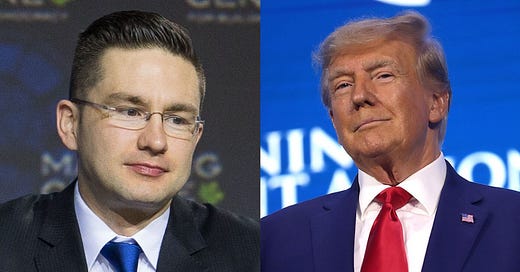Could ‘Trumpism,’ if not Donald Trump, be Canada’s future?
Donald Trump has often suggested Canada should join the U.S. While unlikely, why does Canada seem to be moving toward Trump-style politics?
By Sanjay Dubey
Justin Trudeau’s unexpected resignation as Liberal Party leader has thrown Canada’s political future into flux. After nine years in power, his declining popularity, internal party dissent, and pressures from Donald Trump’s looming economic policies led to his decision. Justin Trudeau himself acknowledged the uphill battle: “This country deserves a real choice in the next election,” he stated, signalling his belief that his leadership was no longer the best path forward.
This resignation comes at a precarious time, with federal elections scheduled before October 2025 and public opinion polls suggesting that the Liberal Party would suffer a significant defeat to the Conservative Party led by Pierre Poilievre. The situation has prompted some to view this as a transformative moment in Canadian politics.
Donald Trump has often joked about Canada becoming part of the United States. While such musings might seem far-fetched, the rise of Pierre Poilievre as a strong contender for Prime Minister raises questions about the alignment of Canadian politics with Trump-style governance.
Pierre Poilievre: Canada’s Donald Trump?
Pierre Poilievre has often been compared to Donald Trump, though opinions on the validity of this comparison vary. Poilievre’s political rhetoric, polarizing messages, and focus on appealing to disenchanted voters mirror Trump’s strategies. Both leaders share a knack for catchy slogans—Poilievre’s “Axe the Tax”, “Justinflation”, and ‘‘Liberals First or Canada First?’’ echo Trump’s “Make America Great Again”—and a disdain for traditional media and political elites.
However, their similarities extend beyond slogans. Like Trump, Poilievre has portrayed himself as a victim of the establishment, claiming to represent the “have-nots” against the “elites”. He also draws large, enthusiastic crowds, leveraging anger and discontent as powerful political tools. “Poilievre’s message is much more polarizing. He banks on anger, which is new in Canada,” observed Professor Genevieve Tellier of the University of Ottawa while talking to AFP.
Despite surface similarities, there are notable differences in their policy priorities. Comparing their positions on three controversial issues—free trade, immigration, and foreign policy—highlights the contrast.
Free Trade:
Donald Trump’s presidency was marked by skepticism of free trade and the imposition of tariffs, including a renegotiation of NAFTA (North American Free Trade Agreement). In contrast, Pierre Poilievre advocates for free trade and reducing international trade barriers, reflecting a pro-globalization stance within conservative boundaries.Immigration:
While Trump’s immigration policy was characterized by hardline measures and divisive rhetoric, Poilievre’s approach is more measured. He ties immigration levels to housing availability, presenting it as a practical issue rather than a cultural or security concern.Foreign Policy:
Donald Trump’s “America First” philosophy often translated into isolationism and non-interventionism. In contrast, Poilievre supports NATO’s stance on Ukraine and has criticized Trudeau for insufficient military aid to counter Russian aggression, marking a clear divergence in their foreign policy outlooks.
The Influence of Trumpism
While Poilievre’s policies may differ from Trump’s, his rise reflects a broader trend of Trump-style populism influencing global politics. This “Trumpism”—characterized by distrust of elites, polarizing rhetoric, and appeals to working-class frustrations—has found fertile ground in Canada too. Poilievre’s association with the 2022 trucker convoy protests against vaccine mandates is a clear example of this alignment.
This means that, if elected, Poilievre’s leadership could significantly reshape Canada’s domestic and international policies. His promise to “put Canada first” echoes Trump’s nationalist rhetoric, and his polarizing style and attacks on media and political opponents could erode the credibility of Canadian institutions—a phenomenon observed during Trump’s presidency.
Yet, some analysts believe that Pierre Poilievre’s approach is more pragmatic, less disruptive, and relatively “tame” compared to Donald Trump’s. His focus remains on economic issues such as cost-of-living concerns, housing shortages, and repealing the carbon tax, steering clear of the nativist or anti-immigrant rhetoric prevalent in other far-right movements.
This restraint may also be due to Canada’s political culture, which prevents him from embracing the more extreme elements of Trumpism. Analysts attribute this to “Canadian exceptionalism,” marked by a strong tradition of multiculturalism and public support for immigration. These factors have tempered the rise of far-right populism in Canada, making it unlikely that Poilievre would adopt Trump’s more divisive policies.
Whether Pierre Poilievre becomes Canada’s Prime Minister at the end of this year or not, and whether he behaves more like Trump or not, one thing is clear: Trump’s shadow looms very large over Canada. This influence is evident in Trudeau’s resignation, as Trump’s threats of 25% tariffs on Canadian goods were damaging enough. His repeated provocations about Canada becoming the “51st state” of the U.S. add further insult, undermining Canadian sovereignty in a manner even Pierre Poilievre finds hard to digest.
Poilievre’s rise also signals a shift in Canadian conservatism toward a more personality-driven, populist model. His consolidation of power within the Conservative Party and the bending of traditional party figures to his agenda is also reminiscent of Trump and his influence over the Republican Party. But unlike Trump’s bombastic and often erratic style, Poilievre’s brand of populism appears grounded in Canadian traditions of pragmatic conservatism—something that might set him apart in the eyes of Canadians and the world.




